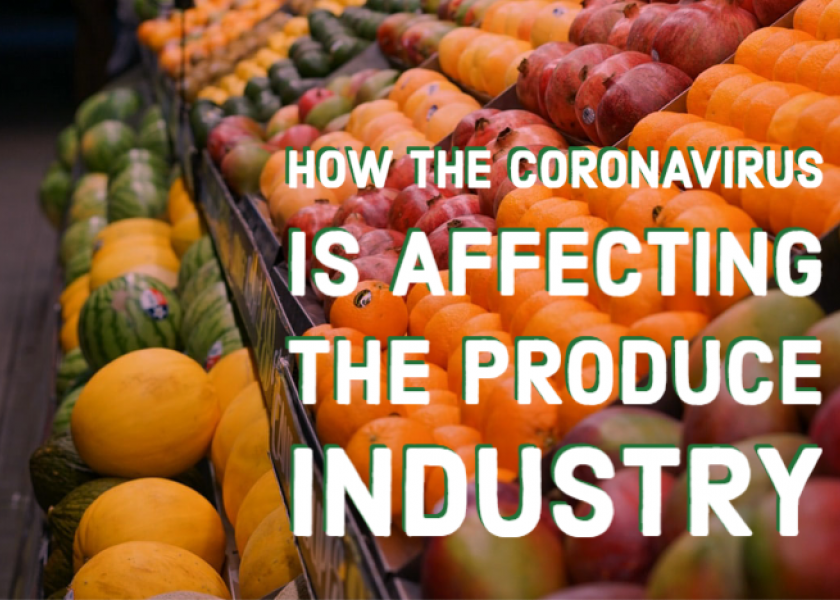UPDATED: Foodservice sector bearing brunt of outbreak

(UPDATED, March 18) Fresh produce shippers and distributors who serve the foodservice sector are likely to be the most affected by the coronavirus COVID-19 outbreak, according to produce analysts from Rabobank.
“Shippers whose business model relies heavily on foodservice (may see) some of the most detrimental impacts because people aren’t wanting to go out in public and spend money,” said Roland Fumasi, vice president and senior analyst for Rabobank’s RaboResearch Food and Agribusiness division, in the second week of March. “We don’t have a lot of data yet, because this is so new, but I’m hoping it’s going to be minor.”
Consumers that want to eat healthier may be motivated to eat more produce such as citrus, with high levels of Vitamin C.
Amid news of the spreading COVID-19 outbreak, the common stock for Aramark, a company that provides food services to about 1,500 colleges and universities, saw a 13.56% one-day decline on March 11.
Since Jan. 29, the stock price for Aramark has declined from $46.20 per share to just over $24 on March 13.
Foodservice vendor Sysco’s stocks declined 11.65% March 11; the per share price for Sysco stock has dropped from $82.84 on Jan. 31 to $47.07 on March 13.
Many primary and secondary public schools were at least temporarily closed in some regions in mid-March.
As of March 13, Washington state has more than 457 cases of COVID-19 and 31 deaths. More than 40 Seattle restaurants announced either temporary or permanent closures because of the fallout from the outbreak, according to a report from seattle.eater.com
In a poll of consumers released in early March by technomic.com, more than three in 10 consumers said they plan on leaving the house less often, not go to restaurants as often or not order food or beverages at away-from-home venues because of precautions related to the coronavirus. About 31% of those who said they will eat out less reported that decreased frequency will last for between one and three months. The survey found 13% said they will order more via restaurant delivery.
The March 11 Pro*Act market report indicated pandemic fears cut foodservice demand for apples from customers like cruise lines and schools. The U.S. Department of Agriculture reported shipping point prices for size 100 Washington golden delicious dropped from $22 to $28 per carton in early January to $18 to $24 per carton in early March.
Tim York, president of foodservice procurement company Markon Cooperative, Salinas, Calif., said foodservice operators have reported lower-trending sales.
“Members told us to expect a drop-off of 30-40% in business, and so far that has proven very accurate,” York said. Open Table (a restaurant reservation website skewed toward high-end restaurants), reports reservations are down in NYC by 64%, Los Angeles 47%, and Chicago 49%, York said.
“Prior to the government recommendation for take-out/delivery only, off-premise dining was already seeing a surge in business,” he said. “We expect that full-service restaurants will rapidly adapt to off-premise dining – if they weren’t already doing take-out/Door Dash, et cetera,” York said.
Consumer behavior
As consumers make fewer but larger shopping trips, Fumasi said sales of frozen produce will likely increase.
With health officials encouraging people to stay away from crowds, Fumasi said online purchases of groceries will likely grow.
One outgrowth of the coronavirus outbreak is that it may introduce online grocery shopping to more consumers.
“For (consumers) who don’t want to be around other people, it gives them an incentive to buy some fresh produce and other groceries online,” he said.
While consumers are often skeptical about quality for perishable online purchases, he said most consumers say produce quality for online purchases is better than they expected.
“So if the (outbreak) causes them to try it and they do have a positive fresh produce experience, maybe they are more willing to do it in the future,” he said.
Check out The Packer’s research about consumer reaction to the coronavirus here.
The Packer's Coronavirus (COVID-19) News Updates







